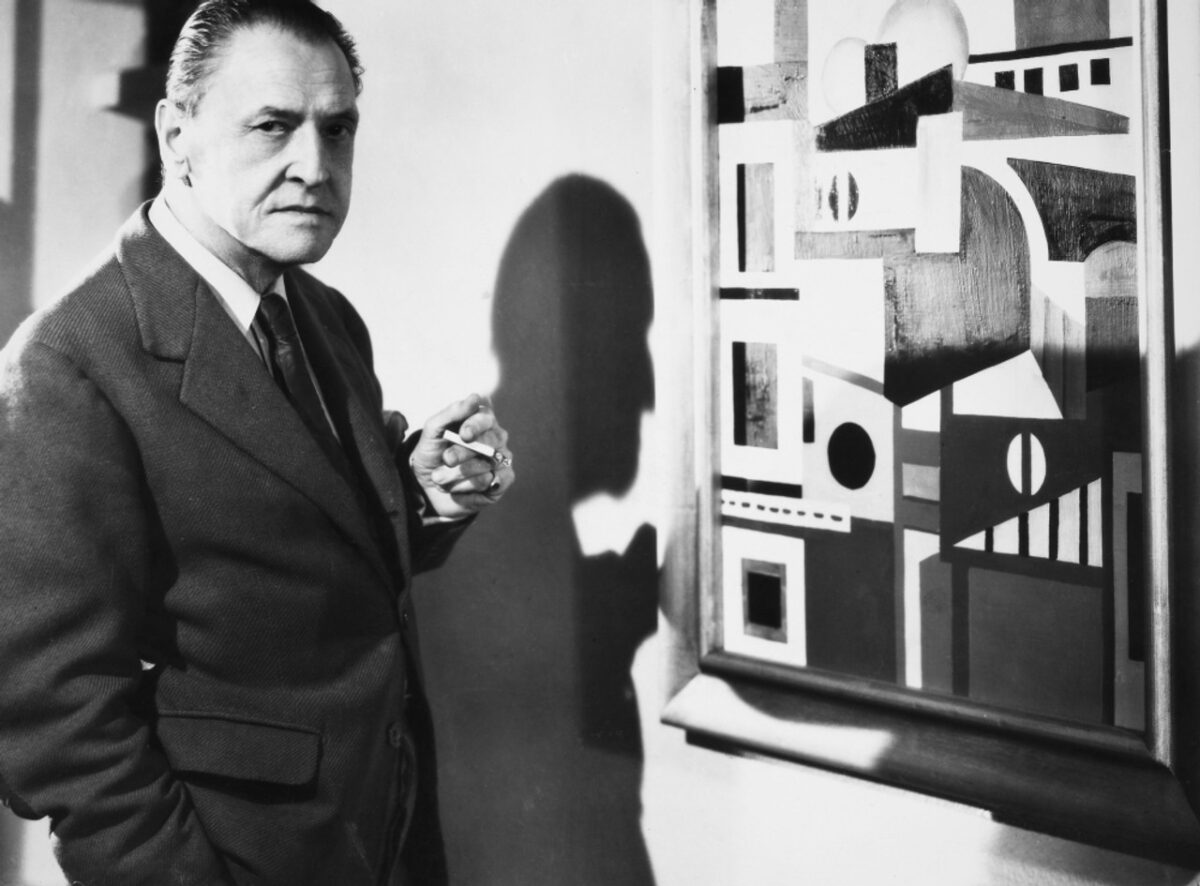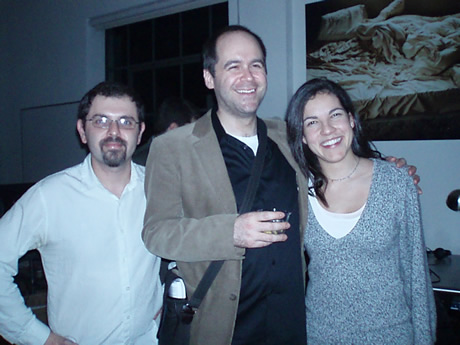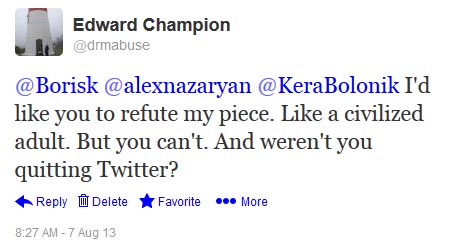(This is the thirty-fifth entry in the The Modern Library Reading Challenge, an ambitious project to read the entire Modern Library from #100 to #1. Previous entry: Heart of Darkness.)
 William Somerset Maugham was a largely gloomy man who just wanted to be loved. And because Maugaham was constitutionally incapable of behaving in the manner of Sally Field accepting her Oscar (and was frequently self-deprecatory), he often wasn’t. It certainly did not help that he was closeted, emo as fuck, fiercely protective of his private life, tight-lipped about his inexorable agony, and reported by many of his acquaintances and admirers as emotionally detached (although he did commit many quiet acts of generosity, including building up a library at The King’s School in Canterbury, where the ashes of Ashenden’s creator were eventually scattered). He frequently quipped that he stood in the first row of second-rate writers, almost to steel himself against the effusive and well-deserved reception he received for his considerable literary accomplishments. The Moon and Sixpence, Cakes and Ale, and The Painted Veil remain remarkably vivacious and salacious for their time and are still eminently readable today.
William Somerset Maugham was a largely gloomy man who just wanted to be loved. And because Maugaham was constitutionally incapable of behaving in the manner of Sally Field accepting her Oscar (and was frequently self-deprecatory), he often wasn’t. It certainly did not help that he was closeted, emo as fuck, fiercely protective of his private life, tight-lipped about his inexorable agony, and reported by many of his acquaintances and admirers as emotionally detached (although he did commit many quiet acts of generosity, including building up a library at The King’s School in Canterbury, where the ashes of Ashenden’s creator were eventually scattered). He frequently quipped that he stood in the first row of second-rate writers, almost to steel himself against the effusive and well-deserved reception he received for his considerable literary accomplishments. The Moon and Sixpence, Cakes and Ale, and The Painted Veil remain remarkably vivacious and salacious for their time and are still eminently readable today.
Maugham’s ardent commitment to the “fuck my life” bit, which one often sees today with glum cube slaves over forty, is best evinced by how difficult it is to find a photograph of Maugham smiling. This man hated himself so much that it’s safe to say that he probably would not have been the right man to ask for a selfie. Maugham’s knack for misery is seen in the themes and the grim humor that often punctuate his lurid fiction: the fixation on death and depression, the sense that all love affairs are fated to suffer an abominable heartbreaking end (often with a protagonist too steeped in butterfingers myopia to recognize what’s right in front of him), and a heartless world that is permanently at odds with the joys of human existence. I don’t think it’s an accident that Bill Murray decided on Maugham as his source material when he attempted to turn to dramatic acting in the mid-1980s. Numerous biographers have made noble attempts to ascertain why Maugham was so hopelessly dolorous, but even with “newly discovered papers,” Maugham’s pitch-black penumbra has stubbornly summoned more enigmatic angles. Despite his affluence, he lived quite modestly and, perhaps due to the publicity of his theatrical work, he perfected the art of suffering in plain sight. Given that he made it all the way to the age of 91, one wonders just what it was that kept this tortured depressive living. His storytelling is often so spellbinding that you just want to give the poor man a hug.
But Maugham was also one of the most successful writers of the early twentieth century. With fame came the relentless hail of stonecold critics who refused to budge from their gilded dogpens and throw Willie a bone. Despite his position on the Modern Library list, Maugham has been unfairly neglected in the 21st century. He is not taught, not stocked in most bookstores, and certainly not mentioned by the bratty hordes who are too busy dropping their knickers over such blinking babies as Colleen Hoover and R.F. Kuang. In 1908, Maugham had four wildly successful plays running simultaneously in London. And by the middle of the 20th century, Maugham was so wealthy, such a seemingly permanent mainstream pasha, that even the iconoclastic Simon Raven singled him out as a member of the protected class to be caviled with. And there was Edmund Wilson’s notorious drive-by on Maugham in the New Yorker (contained in Classics and Commercials): “He is for our day, I suppose, what Bulwer-Lytton was for Dickens’s: a half-trashy novelist, who writes badly, but is patronized by half-serious readers, who do not care much about writing.”
Well, I care very much about writing. And while I will concede that Maugham sometimes resorted to pat imagery, melodrama, and telltale tropes (“If only you knew how heartily I despise myself for loving you!” is one cringey line from Of Human Bondage), he could summon striking imagery when he wanted to. In Of Human Bondage, Maugahm beautifully evokes the hope limning the world’s roughness: “The delicate iridescence of the London air gave the softness of a pastel to the gray stone of the buildings; and in the wharfs and storehouses there was the severity of grace of a Japanese print.” Maugham compares a bottle of Chianti with “a slim fair Circassian guarded by four corpulent eunuchs.” And while such imagery probably did not occur frequently enough for a stodgy stooge like Wilson, Maugham’s fixation on surfaces is also vital to what Of Human Bondage is about: namely, the power of imagination and perception to alter one’s life for the better and to make something of one’s existence even when the chips are down.
In condemning Maugham, Wilson had only read two of Maugham’s novels: Then and Now, a truly mediocre historical novel which even we Maugham stans have to discount, and East is West, which even Wilson had to confess was “quite entertaining.” So why the adamantine hate? Why didn’t Wilson bother to tackle Of Human Bondage, which confidently debunks many of Wilson’s beefs with a writer who generations of readers have rightly loved?) I suspect that Wilson’s reckless irresponsibility here as a critic had more to do with the fact that he was an alcoholic who burned through four wives and who made it his lifelong mission to asphyxiate joy whenever he saw it. (And it’s worth pointing out that Wilson is much uglier and somehow more tormented than Maugham is in photographs, resembling nothing less than the living answer to Harold Skimpole: a rage-filled parasite with a permanent scowl.) Moreover, Wilson’s casus belli seems more motivated by Maugham’s dodgy stances on three of Wilson’s literary heroes: Henry James (whom I also despise), James Joyce (whom I am a perfervid acolyte of), and Yeats (yeah, okay, but I prefer Blake and Berryman). Which essentially makes Edmund Wilson’s position no different from those Comic-Con dweebs duking it out on Twitter (sorry, but I can’t will myself to call it X). Wilson engaged with the man and his views, not the work. His criticism is thus nullified.
Even so, I feel an aching need to defend Of Human Bondage against the likes of Wilson and his hamfisted acolytes — that is, if any of them are even still alive. This brilliant novel is far more than a picaresque Bildungsroman, although Dickens is mentioned multiple times and there are many colorful characters that are clearly inspired by Henri Murger’s Scenes of Bohemian Life, which is also name-checked by Maugham. It is, in short, a novel that adeptly portrays the behavioral patterns established in early life and reckoned with in the next two decades. (To cite one of many repetitive phrases throughout Of Human Bondage, the words “I don’t mind” factor in heavily among Philip’s romances.) Yes, Maugham’s grasp of working-class vernacular is not the greatest, confined largely to elided aitches in the manner of Shaw. But who cares? None of Maugham’s modest failings detract from the feel of the novel or the book’s quirky philosophical asides, which include the claim that suicide is better framed through the loss of money rather than the loss of love. Of Human Bondage is a book for the people. That it still remains remarkably absorbing more than a century after its publication and that its subtle lessons about life are still applicable in the 21st century should count for something.
It’s also a mistake to read this massive novel as transposable autobiography, which Wilson was content to do with Dickens in The Wound and the Bow: “If one approaches his first novel, Pickwick Papers, with these facts of Dickens’ biography in mind, one is struck by certain features of the book which one may not have noticed before.” Of Human Bondage‘s hero, Philip Carey, who we follow from the age of eight (after his parents die and he is adopted by his penurious and religious uncle) to early middle age, has a club foot. Maugham had a lifelong stutter. But the panoramic canvases that Maugham paints of London, Paris, and Heidelberg (to say nothing of Philip’s oppressive early life under his vicar uncle’s thumb, the art world, the medical world, and even the down-and-out Athelnys who show up near the book’s end) clearly tells us that there is something larger and more worldly at stake here.
And while Ruth Franklin suggested thirteen years ago that the doomed affair between Philip and Mildred is what makes this novel “original,” I think Mildred — as enthrallingly malicious as she is — is one of the least interesting aspects of this book, particularly when you consider Maugham’s vast scope. All of us meet a Mildred along the way. All of us make the mistake of rejecting people who are good for us — as Philip does with Norah Nesbitt, a woman estranged from her husband and saddled with a kid who is impressively writing penny dreadfuls to support her family and who, even when listening to Philip, is seen knitting so as not to waste a precious moment. All of us, like Philip, meet certain types over the course of our amorous journey. While my 21st century progressive spirit quibbles with Maugham’s portraits of accomplished women as spinsters, Maugham is nevertheless accurate when it comes to Miss Wilkinson (his first love, ten years older than Philip and treated abominably by the tormented young man) and Norah fill in the hole of his absent mother. (Over the course of the novel, Philip sadly loses the photographs and trinkets that are left of his mother, thus having little more than faint memories mimicked by the women he gets involved with in adulthood.) What counts is how we react to all this and how we become nimbler in this tricky business called living.
Of Human Bondage takes its title from the third section of Spinoza’s Ethics. And for the Wilson-friendly snobs who would decry Maugham’s lifting, claiming this to be as graceless as the way old Star Trek episodes were named after Shakespeare lines, this is hardly a casual reference. Rather interestingly, Philip comes to resent and reject religion over the course of the book. And anyone familiar with Spinoza knows that the famous philosopher was careful to establish the existence of God in the first part of Ethics. (Which causes, uh, issues for a staunch atheist and Spinoza fan like yours truly. But I’ve always found ways to look for spiritual sublimity outside of fictitious deities.) So the rejection of religion is, in some sense, a rejection of life. And one of the great thrills of reading Of Human Bondage is watching Philip gradually come to terms with negotiating existence. There is also a concern for Goethe’s notion of living resolutely in “the whole, the good, and the beautiful” — as mentioned by Hayward, the young man who Philip meets in Germany and who proceeds to make cameo appearances throughout the novel. But Maugham is equally suspect of philosophy when he has Cronshaw, a friend of Philip’s, who has this to say about life’s mysteries:
Have you ever been to the Cluny, the museum? There you will see Persian carpets of the most exquisite hue and of a pattern the beautiful intricacy of which delights and amazes the eye. In them you will see the mystery and the sensual beauty of the East, the roses of Hafiz and the wine-cup of Omar; but presently you will see more. You were asking just now what was the meaning of life. Go and look at those Persian carpets, and one of these days the answer will come to you.
Philip does indeed get his hands on a Persian carpet and hopes that, one day, the carpet will yield the mighty answer. But the carpet is destroyed during a particularly crushing moment. Much like Douglas Adams summoning the number 42 as the answer to life, the universe, and everything, so too is the carpet something of a Macguffin. At a certain point, one has to live instinctively rather than relentlessly ponder what life means. And when Philip loses the carpet (along with most of his fortune due to a foolish investment decision), it is only then when Philip begins to find true happiness, with Maugham telegraphing this hard by concluding Chapter CVI with the one sentence paragraph, “Philip was happy.”
And while Of Human Bondage‘s ending may feel a little too tidy, we do get a sense that Philip has thrown off the shackles that marred his efforts to grow as he bounced around many nations and all sorts of people. We have followed his adventures through the first half of his life. And in the end, he has conquered Spinoza’s “lack of power to moderate and restrain the affects” through the strange hope and humility that often comes with middle age. That Philip has done so after considerable misfortune is a testament to the happiness that poor Maugham himself tried so unsuccessfully to chase throughout his life. But then fiction is very often a prayer sent out into the universe, often entailing what the writer himself cannot possibly find in his life. At one point in the novel when Philip faces significant despair, the young man finds a sense of awe and within El Greco’s View of Toledo. El Greco’s raw colors are not easily found in the everyday, but the painting gives Philip the impetus he needs to find something close to heaven in humility. So too do we in revisiting this enormous and scrappy classic. Philip’s character transformation allows us to forgive him of his terrible treatment of the women who gently entered his life. And, in so doing, this novel allows us to forgive ourselves for our own inevitable transgressions.
Next Up: Anthony Burgess’s A Clockwork Orange!




